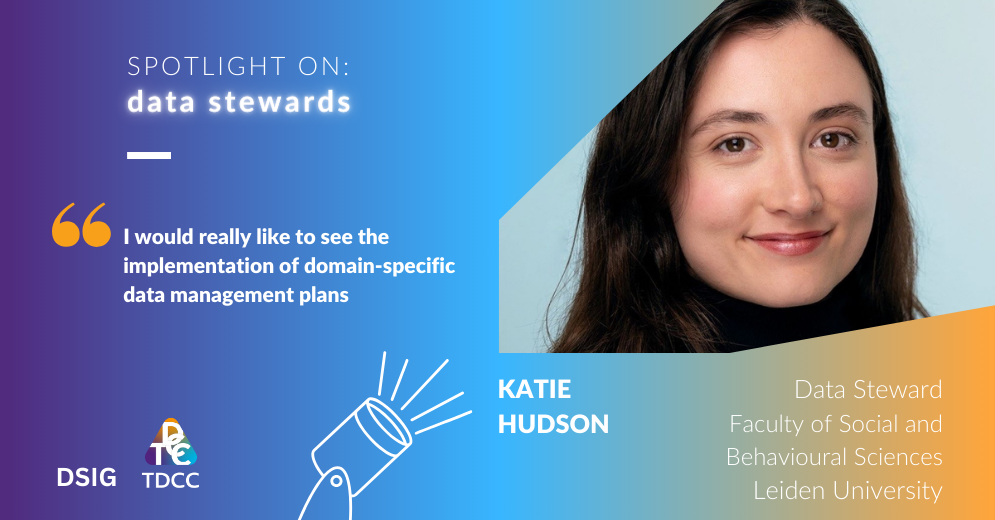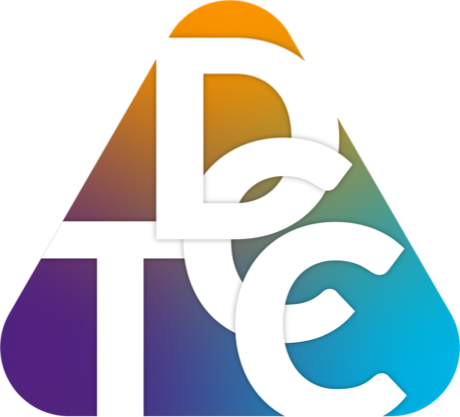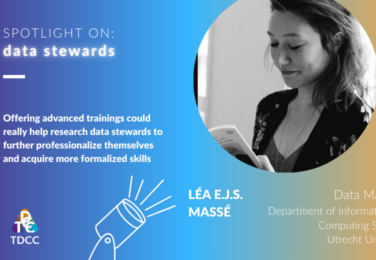Spotlight on: Katie Hudson

Every other week, the Thematic DCCs and the Data Steward Interest Group (DSIG) put the spotlight on one research data steward working in the Netherlands, to stimulate knowledge exchange and peer-to-peer learning.
What drew you towards the research data management field?
I am currently a PhD student in Political Science at the University of Edinburgh, and my own research uses mixed methods. This means I am dealing with lots of types of data, and have an intimate understanding of the challenges that come with RDM from a researcher’s perspective. I also taught Research Design in the second year of my research, where we covered the topics of ethics, integrity and sensitive data.
My PhD is parttime and when looking for jobs I saw the posting for Data Steward, which felt like a great opportunity to apply these skills and develop my knowledge further. I have now been in the Data Steward role since June 2023, working for both the Faculty of Social and Behavioural Sciences (FSW) and the Institute of Political Science.
What is an activity/task of your role that you find yourself looking forward to?
An unexpected and relatively new element of my role has been communications; I have been developing a wiki for our faculty that contains all the RDM-related information that researchers need. I had little previous experience, but was pleasantly surprised that I was able to learn this new skill. This has also given me the confidence to take an active role in the development of our RDM blog, and I’m excited to help with more projects like this going forward!
What is something unexpected that you can offer help with, if a colleague reaches out to you?
A lot of researchers initially assumed my role was more ‘behind the scenes’ and limited to practical RDM support. However, I’m also really interested in the academic discussions underlying Open Science and FAIR data, as well as data colonialism and decolonial approaches to RDM. I have already hosted a lunch seminar touching on these topics which was well-received, so I hope more colleagues will reach out to continue this conversation.
What do you think your community of research data professionals is missing?
I think that our work sometimes lacks visibility, for both researchers and other support and management staff within the university. The role of Data Steward is still new and evolving; our ‘jurisdiction’ partially overlaps with many other areas of expertise (ethics, privacy, ICT, research policy, and even research itself), and at least in certain corners of the social sciences, we’re still figuring out what ‘good’ RDM/Open Science practice and infrastructure should look like.
Communicating all of this to the diverse parties we rely on to continue to support RDM and Open Science within the university system, including support for Data Stewardship, is paramount but also not that easy – and so I think Data Steward trainings should include modules on how to communicate our work to multiple stakeholder groups. The visibility of RDM and Open Science work is also important for researchers themselves, and the national and local Recognition & Reward agendas must meaningfully support researchers’ uptake of good practices in RDM and Open Science – and we are here to help support this recognition.
What is a topic you would want to collaborate on with others?
Right now, our team is collaborating on a TDCC-SSH Bottleneck project proposal for a national consultation of RDM policy, practices and infrastructure. The focus of the project is to understand what research integrity in RDM means to different communities of practice in the Social and Behavioural Sciences, what infrastructure and practices are currently available to support this, and what gaps exist in this domain. The outcomes of this initiative aim to inform an update to an important national RDM guideline that applies to all faculties of Behavioural and Social Sciences in the Netherlands.
We’ve already had some inspiring conversations with our RDM colleagues and researchers across the Netherlands, and I’m really looking forward to the development and execution of this project, where I will be leading the community-building efforts. So, it would be great to hear from researchers, RDM colleagues, and anyone else from the relevant faculties about what types of community-building events they’d like to participate in!
How would you like to see your current field of work evolve in the next 5 years?
There are certain frustrations with DMP templates insofar as the relevance and framing of certain questions vis-à-vis different research practices, especially qualitative and ethnographic approaches. Therefore, I would really like to see domain-specific DMPs be implemented. Until now, this has not been possible due to DMP formatting requirements from research sponsors. However, a group of Leiden colleagues (from our FSW RDM Team, the Centre for Science & Technology Studies [CWTS], and the Centre for Digital Scholarship [CDS]) together with a team at SURF was recently awarded a grant to conduct a national pilot exploring the implementation of machine actionable Data Management Plans (maDMPs), part of the Horizon-funded OSTrails project. The national pilot consortium also includes representation from the NWO as well as RDM colleagues from several other Dutch universities and universities of applied sciences.
One of the key deliverables of the pilot will be a series of discipline-specific maDMP templates, giving us the unique opportunity to experiment with discipline-specific data management planning in a setting where our pilot consortium partners and policymakers from the NWO can collectively learn about the benefits and challenges of creating and using discipline-specific DMPs. Alongside more flexibility in the templates that reflect the disciplinary requirements of the researchers, we also hope to learn more about how machine actionable DMPs can contribute to reducing the bureaucratic burden for researchers, improve communication about DMPs between the relevant stakeholders, while also enriching open research information infrastructures with higher quality (meta)data about outputs generated by researchers working in the Netherlands.
Get in touch with Katie: Leiden University staff page
Do you want to read other interviews published in the Spotlight on series? Visit the series' page.
Are you a data steward or data professional who wants to be featured in one of the future editions? Fill out this form.



